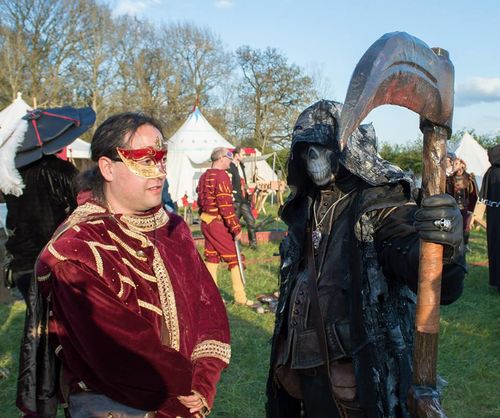The Masquerade of the Reaper
Celebration
Even in mourning, the League cannot help but make a grand show. Each year at the Winter solstice, the Masquerade of the Reaper offers citizens of all four cities a chance to celebrate the lives of those they have lost, which they do with great style.
The festival has its roots in dramaturgy and the League's love affair with masks - although some scholars point out semantic similarities with the Highborn - Day of the Dead which also takes place at the Winter Solstice .
At Anvil, a central role is played by the nation's egregore, who dons the mask of the Reaper, bringing back the shades of the recently deceased from the Labyrinth in a grand procession through the streets. In many ways, the egregore becomes a cultural death guiser, touring the camp, visiting every guild and being given a small gift. Anyone who has died in the last year might be represented by a death guiser, who will then follow the Reaper in their procession, ending at the grand plaza. There, any of the citizens of the League who attend Anvil may speak with them and make a (symbollic) public presentation to the spirits of the dead.
Being asked to take on the death guise at any time implies a great deal of trust and respect, but this is especially true at this grand memorial performance. Any words said to the masked figure are, as far as Leaguers are concerned, spoken to the dead and thus to be taken to the Labyrinth. The role is taken very seriously - significant Dead Reckoning may be recorded for the favour of taking on a guise, or the honour of being asked.
Powerful hearth magic is associated with this festival. It is considered the worst possible luck to let the Reaper see your own face, as then they will know what to look for during the year to come. Any Leaguer thus knows the importance of wearing a mask for protection, while many have tales of someone who flaunted this tradition and came to an unfortunate end soon after. Scholars often compare this dramaturgic personification of Death to that of the Freeborn. On the Brass Coast, Death is often portrayed as a foolish figure of fun; while there is an air of festivity to the role of the Reaper, the traditions that surround its celebratory incarnation are deadly serious. It is unsurprising that the two nations have similar customs relating to the personification of death - some scholars see this as a reaction to their shared historical connection to the Highborn.
Festivities will continue long after dark, with the guilds remaining open for business as the central Plaza transforms into the night market. A visitor to The League camp at this time might be forgiven for thinking the whole area was reminiscent of a stage, with every citizen performing. They would not be far wrong.
Traditions
Entertainments
The festival includes a great many entertainments; and as in all things, the League cannot help but be competitive about them. No-one officially judges who performs the finest play or hosts the finest gathering, but be in no doubt that citizens keep score of who and what has impressed or offended them. Leading theatre troupes and musicians will be sure to perform publically and many of the more fashion conscious will choose this time to reveal their new outfits.
Bridge Duelling
Some of the competition is more obvious to an outsider. Bridge Duelling is a popular sport between bravos, a sport often credited as a satire of the relations between the twin cities of Tassato. One team will stake out an area as their 'bridge' and challenge all comers who wish to cross it. This culminates in a grand series of duels where competitors fight for ribbons. Duellists can choose to stake a number of ribbons from their collection against each other, but a greater number are often won from admirers in the crowd who applaud showmanship, wit and style as much as combat prowess. In keeping with the masked nature of the festival, it is common for combatants to adopt a persona and announce themselves under a name chosen for the occasion, rather than their own.
Gifts
The giving of gifts to loved ones is very common during the festival, although individual guilds have very varied traditions; outsiders would be well warned to subtly find out what is normal for any guild they have regular dealings with. For some, the gift of food and drink is the norm, while others take pride in giving small but much more personal trinkets.
Mountebanks and Tricksters
Amongst the street magicians the festival has a gained a slightly different flavour. It is known unofficially as the Masquerade of the Red Dancer. Daring acts of sabotage and infiltration are commited under heavy masks, and it is said the greatest long cons have reached their climax on this night. The knowledge of this tradition adds an extra frisson of danger to the celebration - at the back of the mind of each prince and bishop is the vague suspicion that this might be the night where some unscrupulous trickster, grifter or thief unravels their carefuly laid plans.
The orphans lined up on the marble steps, ready in their best clothes and every face covered with a mask - all except one small petulant blue face in the middle ranks. One of the guardians of the Little Mother soon swooped forward.
"Giovanna, put your mask on!"
"But Mother, it is uncomfortable, and the ribbon makes my gills itch."
"It's terrible luck if the Reaper sees you! Do you want him to know your face?"
"But Mother, in lessons they said luck is a heretical idea and not real."
